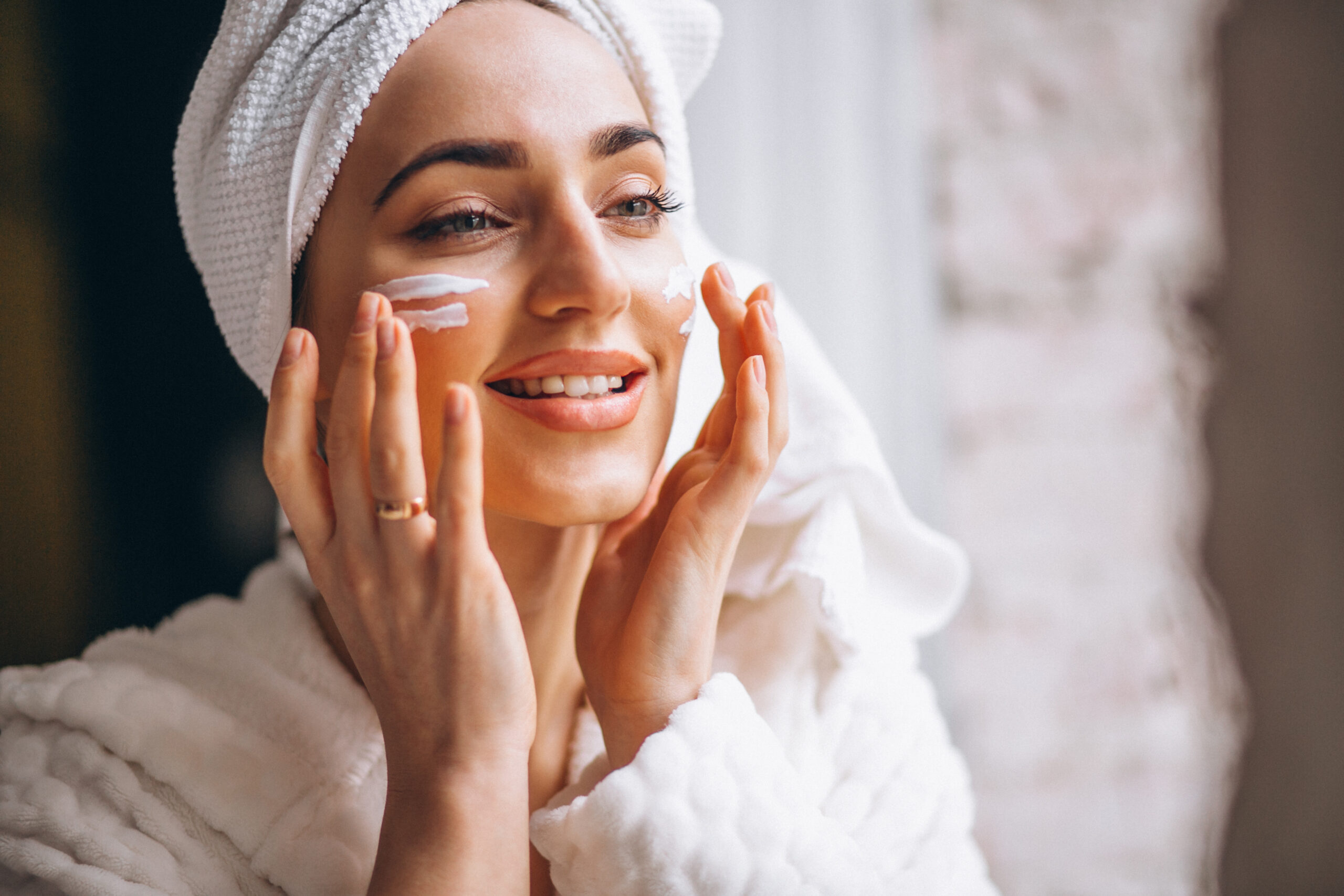Your cart is currently empty!

Essential Skincare Routine: Step-by-Step Guide for Healthy Skin
Discover the Perfect Daily Skincare Routine for Your Skin Type and Achieve Radiant Results
Who doesn’t dream of having flawless, glowing skin? With so many products and routines out there, it can be overwhelming to know where to start. This blog post will guide you through the essential skincare steps everyone should follow for healthy, radiant skin. Whether you’re a skincare newbie or a seasoned pro, these tips will help you refine your routine and ensure your skin looks its best.
Introduction
In a world filled with pollution, stress, and harsh weather conditions, maintaining healthy skin can be a challenge. A consistent skincare routine is crucial in protecting your skin from damage and keeping it looking youthful. This guide will help you understand your skin type, and walk you through the must-have steps in any skincare routine, along with tips for special skin concerns and the importance of a healthy lifestyle.
Understanding Your Skin Type
Before you start any skincare routine, it’s essential to know your skin type. This will help you choose the right products and treatments tailored to your needs.
Types of Skin
There are generally five main skin types:
- Normal Skin – Well-balanced, not too oily or dry.
- Oily Skin – Excess sebum production, often shiny with larger pores.
- Dry Skin – Lacks moisture, can be flaky or rough.
- Combination Skin – Oily in some areas (like the T-zone) and dry in others.
- Sensitive Skin – Prone to redness and irritation.
Identifying Your Skin Type
To identify your skin type, wash your face with a gentle cleanser and wait for an hour without applying any products. Observe how your skin feels:
- If it feels comfortable and not excessively oily or dry, you likely have normal skin.
- If it’s shiny and greasy, you have oily skin.
- If it feels tight and flaky, you have dry skin.
- If it’s oily in some areas (typically the forehead, nose, and chin) and dry in others, you have combination skin.
- If it reacts with redness or irritation, you have sensitive skin.
Understanding your skin type is the first step in creating an effective skincare routine tailored to your specific needs.
Essential Daily Skincare Steps
No matter your skin type, there are a few fundamental steps that everyone should incorporate into their daily routine for healthy, glowing skin.
Cleansing
Importance of Cleansing
Cleansing your skin is the foundation of any effective skincare routine. It removes dirt, oil, and impurities accumulated throughout the day, preventing clogged pores and breakouts.
Choosing the Right Cleanser
Select a cleanser suited to your skin type:
- For normal skin, opt for a gentle, balanced cleanser.
- Oily skin benefits from foaming or gel cleansers that control excess oil.
- Dry skin thrives on creamy or hydrating cleansers.
- Combination skin can use a gentle, balancing cleanser.
- Sensitive skin requires a very mild, fragrance-free cleanser.
Tips for Proper Cleansing
- Wash your face twice daily—morning and night.
- Use lukewarm water, as hot water can strip your skin of its natural oils.
- Gently massage the cleanser into your skin for about 30 seconds, then rinse thoroughly.
- Pat your face dry with a clean towel, avoiding aggressive rubbing.
Exfoliation
Benefits of Exfoliation
Exfoliation removes dead skin cells, allowing new, healthy skin to surface. It improves skin texture, evens out skin tone, and enhances the absorption of skincare products.
Incorporating Exfoliation into Your Routine
Depending on your skin type and sensitivity, exfoliate 1-3 times per week:
- Physical exfoliants use granules to scrub away dead cells but can be harsh on sensitive skin.
- Chemical exfoliants (AHAs, BHAs) dissolve dead cells without scrubbing and are suitable for most skin types.
Tips for Safe Exfoliation
- Be gentle; avoid scrubbing too hard.
- Follow with a moisturizer to prevent dryness.
- Don’t over-exfoliate, as it can lead to irritation and damage.
Moisturizing
Role of Moisturizers
Moisturizers lock in hydration, keeping your skin soft and supple. They create a barrier to protect against environmental stressors.
Choosing the Right Moisturizer
- Normal skin can use a lightweight, hydrating moisturizer.
- Oily skin benefits from oil-free or gel-based moisturizers.
- Dry skin needs rich, creamy moisturizers with ingredients like hyaluronic acid.
- Combination skin can use a balanced, light moisturizer.
- Sensitive skin requires a fragrance-free, hypoallergenic moisturizer.
Special Care for Specific Skin Concerns
Different skin concerns require specialized care. Here’s how to address some of the most common issues.
Acne-Prone Skin
Skincare Routine Recommendations
- Cleanse with a gentle, non-comedogenic cleanser.
- Use a toner with salicylic acid to unclog pores.
- Apply a spot treatment containing benzoyl peroxide or tea tree oil.
- Moisturize with an oil-free, non-comedogenic moisturizer.
Ingredients to Look For and Avoid
- Look for ingredients like salicylic acid, benzoyl peroxide, and tea tree oil.
- Avoid heavy oils, alcohol-based products, and comedogenic ingredients.
Aging Skin
Anti-Aging Skincare Tips
- Use a gentle cleanser to avoid stripping your skin of natural oils.
- Incorporate a serum with antioxidants like vitamin C.
- Apply a retinol product at night to promote cell turnover.
Incorporating Serums and Treatments
- Antioxidant serums protect against environmental damage.
- Retinoids reduce fine lines and wrinkles.
- Hyaluronic acid boosts hydration and plumps the skin.
Sensitive Skin
Gentle Skincare Routine
- Use a mild, fragrance-free cleanser.
- Apply a soothing toner with ingredients like chamomile or aloe vera.
- Moisturize with a hypoallergenic, non-irritating product.
Product Recommendations and Ingredients to Avoid
- Choose products labeled for sensitive skin.
- Avoid fragrances, alcohol, and harsh exfoliants.
Sun Protection
Importance of Sunscreen
Sunscreen is your best defense against premature aging and skin cancer. It protects your skin from harmful UV rays.
Choosing the Right Sunscreen
- Use a broad-spectrum sunscreen with at least SPF 30.
- Opt for mineral sunscreens if you have sensitive skin.
- Reapply every two hours when exposed to the sun.
How to Apply Sunscreen
- Apply generously to all exposed skin areas.
- Don’t forget often-missed spots like ears, neck, and hands.
- Use it as the last step in your morning skincare routine.
Nighttime Skincare Routine
Significance of a Nighttime Routine
Your skin repairs itself while you sleep. A nighttime routine enhances this process, ensuring you wake up with refreshed, rejuvenated skin.
Steps for a Basic Nighttime Routine
- Double cleanse to remove makeup and impurities.
- Apply a hydrating toner or essence.
- Use a treatment product (retinol, serums).
- Finish with a rich, nourishing moisturizer.
Beyond Skincare: Healthy Lifestyle Habits
Good skin health isn’t just about what you put on your skin. Your lifestyle plays a crucial role.
Diet and Hydration
- Eat a balanced diet rich in fruits, vegetables, and healthy fats.
- Drink plenty of water to keep your skin hydrated from within.
Stress Management
- Practice stress-reducing activities like yoga, meditation, or exercise.
- Ensure you get enough sleep, as rest is crucial for skin repair.
Conclusion
A consistent skincare routine tailored to your skin type is essential for healthy, glowing skin. By following these steps and incorporating the right products, you can achieve the skin you’ve always dreamed of. Remember, it’s never too late to start taking care of your skin. Begin your skincare journey today and see the transformation for yourself. And if you need personalized advice, don’t hesitate to reach out to our experts who are ready to help you achieve your skincare goals.

Leave a Reply